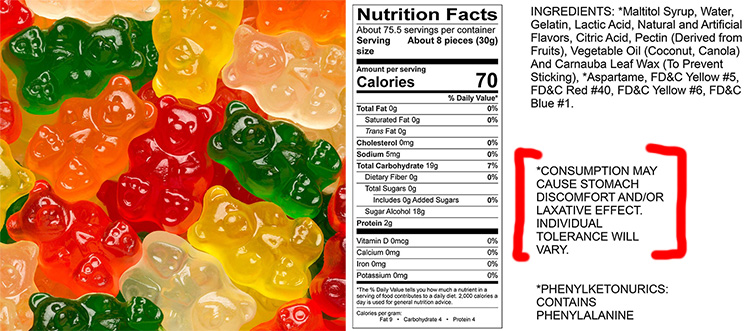Haribo sugar-free gummy bears have taken the internet by storm, not only for their delectably chewy texture and vivid flavors but also for the flood of reviews that range from overwhelmingly positive to downright nightmarish. As people seek healthier options, these sugar-free treats have become increasingly popular, yet the conversations they spark often dive into the bizarre. Let’s unpack the dual nature of this candy, highlighting both the appeal and the notorious side effects that have earned it a place in both candy aisles and health discussions.

amazon reviews of haribo sugar free gummy bears
The Allure of Sugar-Free Candy
Sugar-free gummy bears serve as a tempting treat for those looking to indulge in sweets without the guilt associated with traditional sugar-laden options. According to renowned nutritionist Dr. Marion Nestle, “Many consumers are misled by the idea that sugar-free equates to healthier, when, in fact, the sweeteners used can cause their own set of issues.”
Health Benefits and Drawbacks
While the primary allure of Haribo sugar-free gummy bears lies in their ability to satisfy a sweet tooth without contributing to caloric intake, they also contain maltitol, a sugar substitute. This ingredient can lead to gastrointestinal distress for some individuals, sparking numerous amusing (and unfortunate) experiences shared online. A viral Amazon review states, “I purchased these gummy bears thinking it would be a delightful treat, only to find myself on a bathroom expedition that would put any theme park ride to shame!”
Exploring the Mixed Reviews
Reviews of Haribo sugar-free gummy bears tend to fall into two camps: those who rave about the taste and texture, and those who decry the aftermath of consumption. Myriad comments flood sites like Amazon, with one reviewer humorously exclaiming, “These gummy bears are not food; they are a weapon!”
Positive Feedback
Many consumers praise Haribo gummy bears for their authentic fruit flavors, describing them as “soft” and “true-to-taste.” Renowned food critic Mark Bittman emphasizes the importance of flavor in any dessert, stating, “If something tastes good, it can be forgiven much, including a touch of guilt.” People indulge in the idea of enjoying sweets while maintaining a balanced diet.
The Dark Side of Gummy Bears
Conversely, many reviewers recount their harrowing experiences after overindulging on the sweet treats. One infamous review described the “mass pandemonium” to follow a binge on gummy bears, noting that “the after-effects felt like I had swallowed a grenade.” It’s essential to heed these warnings, as Dr. Nestle advises moderation, saying, “Consumption should always be balanced, regardless of whether it’s seen as ‘healthier.’”
Addressing Common Concerns
The Sweetener’s Role
What exactly is maltitol, the artificial sweetener found in sugar-free gummy bears? Nutrition experts clarify that maltitol often does not result in the same blood sugar spikes as regular sugar, making it appealing for those monitoring insulin levels. However, the consequences of excessive consumption, particularly digestive discomfort, cannot be overlooked. The absurdity of the backlash against these bears reveals how people often underestimate how their bodies will react to sugar substitutes.
Anecdotal vs. Scientific Evidence
It’s vital to differentiate the anecdotal evidence of side effects from established scientific inquiry. Some medical professionals have noted that an individual may react differently to sugar alcohols based on overall digestive health. As the viral reviews and mixed responses showcase, everyone’s digestive landscape is unique.
Embracing a Healthy Mindset
When it comes to snacks like Haribo sugar-free gummy bears, self-love and balance are key. Nutritionist Ellie Krieger states, “Enjoying what you eat while being mindful of your body’s signals is part of a healthy lifestyle.” Encouraging readers to be conscious of their choices while still allowing for indulgence fosters a balanced relationship with food.
The Moral of the Story
Ultimately, finding a way to enjoy treats without compromising personal health is a common goal. Haribo sugar-free gummy bears can be a part of that journey—but with caution. The juxtaposition between their delightful taste and the potential digestive chaos they might unleash is a colorful testament to the broader theme of indulgence versus moderation.
Conclusion: A Delightful Dilemma
As consumers navigate the fine line between craving sweets and maintaining health, Haribo sugar-free gummy bears serve as both a treat and a cautionary tale. It is a microcosm of modern food culture where indulgence meets wellness, reminding us all that moderation, self-awareness, and humor are the best ingredients for a balanced life.
FAQ
1. Why did HARIBO discontinue sugar-free gummy bears?
HARIBO faced significant backlash due to reports of serious digestive issues related to the consumption of their sugar-free gummy bears. While they did not officially discontinue the entire line, they altered their approach based on consumer feedback.
2. What is the sweetener in HARIBO sugar-free gummy bears?
The primary sweetener used is maltitol, which can lead to laxative effects when consumed in large quantities.
3. Are HARIBO gummy bears gluten-free?
Yes, HARIBO gummy bears are gluten-free, making them suitable for individuals with gluten sensitivities.
4. Do sugar-free gummy bears have fewer calories than regular ones?
Typically, sugar-free gummy bears have fewer calories than their sugar-laden counterparts, but the caloric difference can vary based on serving size and specific product formulations.